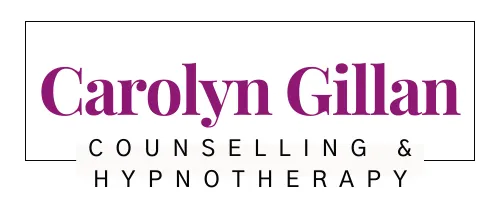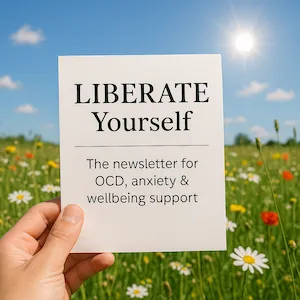
Eight things you can do to improve your OCD
I was interviewed by ITV West Country News in 2021 about supporting people with OCD during the Covid pandemic lockdowns. One of the questions I was asked was ‘What can people do if they’re worried their OCD is getting worse?’ Here are my eight key tips.

1. OCD is treatable
Please don’t suffer in silence, OCD is treatable and it is possible to get better. I’ve witnessed many clients transform their lives and achieve what they hoped was possible… that the obsessions and compulsions would no longer cause a problem for them. Just like it’s possible to recover from a cold without actually needing to find a cure for it, it is possible to recover from OCD. You can learn to turn the volume down on those obsessive thoughts so that they don’t bother you any longer and you no longer need to perform those compulsions.
2. Act sooner rather than later
OCD tends to weave its way more and more into people’s lives if it’s left unchecked, so the sooner you begin to tackle it the better. That said, I’ve worked with people who’ve suffered with OCD for more than 20 years and they’ve very successfully been able to find relief from it.
3. Knowledge is power
The more you understand about OCD and how it maintains it’s grip on you, the better prepared you will be to tackle it. There’s some really great free information out there, and some not so great. I recommend the following charities’ websites:
Both websites contain really excellent information and advice, including links to discussion forums and support groups.
4. Contact your GP or healthcare provider
Your GP or healthcare provider will be able to discuss the possibility of accessing therapy or other available treatment options.
5. Find a private therapist
If you decide to find a therapist privately, look for someone who’s registered with a professional organisation accredited with the Professional Standards Authority, like the BACP, UKCP or CNHC. Counselling and psychotherapy is an unregulated profession, so finding someone registered with one of these professional organisations will ensure that they hold legitimate and appropriate qualifications.
The treatment which has the best evidence for helping with OCD is Cognitive Behavioural Therapy (CBT) with Exposure Response Prevention (ERP). In simple terms, this approach combines strategies for changing how you think about the obsessions and how you behave in response to them. Over time the obsessive thoughts become less and less bothersome so you’ll no longer need to act on them.
Whilst hypnotherapy isn’t an evidence-based treatment for OCD, there is evidence that it can be helpful for reducing anxiety which often makes OCD worse.
When you’re looking for a therapist, it’s also really important you find someone you get on with and feel you can open up to.
6. Be gentle with yourself
Most of the people I see suffering with OCD are really tough on themselves. Many hide their OCD from family, friends and work colleagues. They often suffer in silence, feeling ashamed and frustrated with themselves for not being able to cope better or resist the obsessive thoughts and compulsions. Taking small, patient steps is the best way to tackle OCD. Be kind to yourself.
7. Self-help for OCD
One way of taking that first small step is to write down a list of your obsessions and compulsions, ranking them in order from the most to least distressing. When you’re feeling ready, you can begin to challenge the OCD by resisting the ritual (compulsion) associated with the least distressing obsession. At first you might just want to resist for a couple of minutes and then gradually extend the time. This will help you learn that you can tolerate the anxiety and that it will eventually pass by itself without the need to perform the ritual. Once you’ve successfully achieved this first challenge, you can move onto the next least distressing obsession, and so on…
It can really help to have a therapist support you through this process but if this isn’t possible or desirable, you could try this FREE online OCD Challenge programme, provided by the Peace of Mind Foundation based in the USA to help you instead.
Breathing techniques and mindfulness
Breathing techniques and mindfulness practice can help to reduce anxiety. The key with both of these is to practice, practice, practice… The more you practice when you’re feeling calm, the more they can help you as you feel the anxiety escalate. It’s like running a marathon, you wouldn’t expect to turn up to a marathon and expect to complete it without having done any training for it. The same goes for these techniques.
Diaphragmatic/belly breathing
Place a hand on your tummy and take a deep breath in. The aim is to breathe into your tummy so that you can feel your hand rise. Now blow a long slow breath out so that your tummy deflates and your hand falls. This can take a bit of practice and may feel a bit strange at first. The key is to make your exhale longer than your inhale, inflating your tummy on the inhale and deflating your tummy on the exhale. Practice this for a few minutes, several times daily. Then when you feel your anxiety rise you can use this technique to induce calmness and relaxation.
Mindfulness
Mindfulness has been proven to reduce stress and anxiety. I really like the FREE Smiling Mind App, although there are many others to choose from. Smiling Mind provides different programmes depending on your needs. You can find some great information about mindfulness on their website too.
Self-help books on OCD
There are many self-help books out there on OCD. One book that many of my clients find helpful is ‘Overcoming Unwanted Intrusive Thoughts: A CBT-Based Guide to Getting Over Frightening, Obsessive, or Disturbing Thoughts’ by Sally Winston and Martin Seif. It’s an accessible read that explains complex ideas in easy to understand ways and offers strategies to help you change your beliefs and attitudes towards the OCD thoughts.
8. Plan what you want to do with your extra free time
OCD takes up so much time. So when you are free from it, you can look forward to having lots more spare time. What do you want to do with that time instead and what difference will it make to you?


